#kidney disease awareness
Text
As some of you may know I have end stage kidney diseases. July last year I finally got my transplant and even tho I'm doing so much better the battle is not over. March is kidney awareness month.

0 notes
Text
W.T.F
Don't you just love it when you have to prove you're still disabled and that incurable things haven't magically cured over night🙄.
I deal with chronic pain 24/7 because of a kidney disease I inherited off my dad's side of the family, Polycystic kidney disease is something that has no cure and like other diseases affects people differently, for me thankfully for now my kidneys work just fine but are riddled inside and out with cysts which causes me crippling pain all day everyday, because of the medical neglect I received at the start of the pain 8 years ago, I now have other issues, and lets not get start on the mental lol.
Now I have to prove to PIP, AGAIN, that I have not magically gotten better, I understand people lie but they have all my medical proof off good doctors and hospitals.
Sorry just needed to get this off my chest so to speak.
#kidney diseases#polycystic kidney disease#disability#scoliosis#chronic illness#chronic pain#chronic fatigue#PIP#disability rights#physical disability#disability awareness#hidden disability#disability pride#medical neglect#disabilities
11 notes
·
View notes
Text
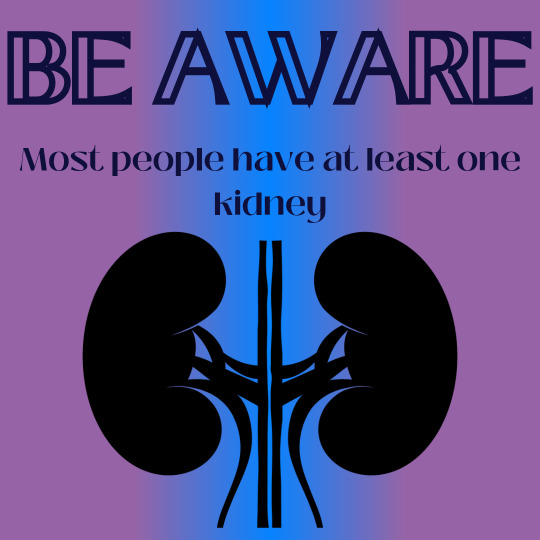
Since I can't post the shitpost I thought of for National Kidney Awareness Week on the company SM...I'd share it here...
#shitpost#kidney awareness#kidney disease#marketing shit#shit we do to brainstorm#my brain didnt want to storm today
6 notes
·
View notes
Text
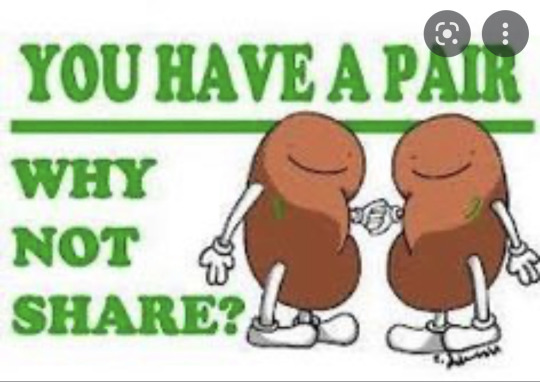
I’m a pediatric registered nurse. I’ve been on dialysis since I was 9 years old and I’m now 27. If you want to hear more of my story click the link.
Donate! Share! Think about becoming a living donor!
#black girl magic#black girls rock#healing#black women#kidney failure#chronic kidney disease#chronic kidney failure#kidney transplant#ckd#ESRD#organ donor#organ donation#organ donation awareness#I Need A Kidney#black nurses matter#black nurses rock#pediatric nurse#pediatric registered nurse#registered nurse#chronic pain#chronic illness#kidney Donor#Kidney donor need#john hopkins hospital#end stage renal disease#atypical hus#Hemolytic Uremic Syndrome#HELP#poetry
8 notes
·
View notes
Text
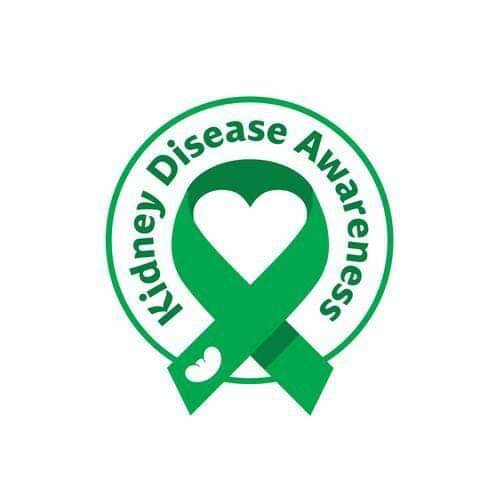
My boyfriend is fighting stage 4 kidney failure. He's starting another hospital stay today. I can't wait to have him back home.
3 notes
·
View notes
Text
A Beacon of Hope: How a Chat Room Helped Destiny-Rae, 5, Find a New Kidney in the UK
Introduction:
Destiny-Rae, a bright and resilient 5-year-old girl, faced a daunting challenge when she was diagnosed with kidney failure. Her journey to find a life-saving kidney transplant seemed uncertain until a remarkable turn of events unfolded through the power of social media and online communities. In this heartwarming blog, we explore how Destiny-Rae’s story of hope and perseverance…

View On WordPress
#1. Destiny-Rae#10. Hope and perseverance#11. Pediatric healthcare#12. Living donor transplant#13. Compassion and generosity#14. Health awareness#15. Pediatric patient advocacy#16. Medical advancements#17. Organ transplant success#18. Community support#19. Life-changing surgery#2. Kidney transplant#20. Digital solidarity#21. Pediatric organ donation#22. Kidney disease awareness#23. Family resilience#24. Organ donor registration#25. Pediatric healthcare advocacy.#3. Organ donation#4. UK healthcare#5. Pediatric nephrology#6. Organ donor advocacy#7. Online communities#8. Social media impact#9. Medical miracles
0 notes
Text
youtube
Welcome back to our channel! In this video, we'll dive into a crucial topic concerning kidney health. Our kidneys play a vital role in maintaining overall health, filtering waste, regulating fluid balance, and controlling blood pressure. 👉 Subscribe to my channel to stay tuned: / @healthyhabitshub-zk9fz
✅Want to create automated professional videos? Visit the following link: https://pictory.ai/?ref=healthy46
🚫 Avoid These 6 Harmful Foods for Optimal Kidney Health:
1. Processed Foods: Ready-to-eat meals, canned soups, and fast food items are often high in sodium, which can lead to high blood pressure and kidney damage.
2. Sugary Drinks: Beverages like soda, energy drinks, and sweetened fruit juices are loaded with fructose, contributing to obesity and diabetes, both risk factors for kidney disease.
3. Red Meat: While red meat provides high-quality protein, excessive consumption can strain the kidneys. Metabolizing protein byproducts may lead to kidney damage and increase the risk of kidney stones.
4. Salt: A high-sodium diet can elevate blood pressure, a major risk factor for kidney disease. The kidneys regulate sodium levels, and excessive salt intake can impair kidney function. Choose low-sodium alternatives and monitor salt intake.
5. Caffeine: Caffeine, a diuretic, can increase urine production, potentially leading to dehydration and stressing the kidneys. Moderate caffeine consumption and staying adequately hydrated are essential for kidney health.
6. Alcohol: Chronic alcohol consumption can be damaging to the kidneys, leading to kidney disease and impaired function. Alcohol can also disrupt fluid and electrolyte balance, causing dehydration. Consume alcohol in moderation and be mindful of its impact on kidney health.
#kidney health#kidneys#protect your kidney#avoid foods for kidney disease#foods to avoid#how to keep your kidneys healthy#foods to avoid for kidney health#avoid these 6 harmful foods for optimal kidney health#be aware of kidney-damaging foods#6 worst foods that can damage your kidneys#ways to keep your kidneys healthy by avoiding foods#6 foods that can destroy your kidneys#harmful foods for optimal kidney health#Youtube
0 notes
Text
youtube
Welcome back to our channel! In this video, we'll dive into a crucial topic concerning kidney health. Our kidneys play a vital role in maintaining overall health, filtering waste, regulating fluid balance, and controlling blood pressure. 👉 Subscribe to my channel to stay tuned: / @healthyhabitshub-zk9fz
✅Want to create automated professional videos? Visit the following link: https://pictory.ai/?ref=healthy46
🚫 Avoid These 6 Harmful Foods for Optimal Kidney Health:
1. Processed Foods: Ready-to-eat meals, canned soups, and fast food items are often high in sodium, which can lead to high blood pressure and kidney damage.
2. Sugary Drinks: Beverages like soda, energy drinks, and sweetened fruit juices are loaded with fructose, contributing to obesity and diabetes, both risk factors for kidney disease.
3. Red Meat: While red meat provides high-quality protein, excessive consumption can strain the kidneys. Metabolizing protein byproducts may lead to kidney damage and increase the risk of kidney stones.
4. Salt: A high-sodium diet can elevate blood pressure, a major risk factor for kidney disease. The kidneys regulate sodium levels, and excessive salt intake can impair kidney function. Choose low-sodium alternatives and monitor salt intake.
5. Caffeine: Caffeine, a diuretic, can increase urine production, potentially leading to dehydration and stressing the kidneys. Moderate caffeine consumption and staying adequately hydrated are essential for kidney health.
6. Alcohol: Chronic alcohol consumption can be damaging to the kidneys, leading to kidney disease and impaired function. Alcohol can also disrupt fluid and electrolyte balance, causing dehydration. Consume alcohol in moderation and be mindful of its impact on kidney health.
#kidney health#kidneys#protect your kidney#avoid foods for kidney disease#foods to avoid#how to keep your kidneys healthy#foods to avoid for kidney health#avoid these 6 harmful foods for optimal kidney health#be aware of kidney-damaging foods#6 worst foods that can damage your kidneys#ways to keep your kidneys healthy by avoiding foods#6 foods that can destroy your kidneys#Youtube
0 notes
Text
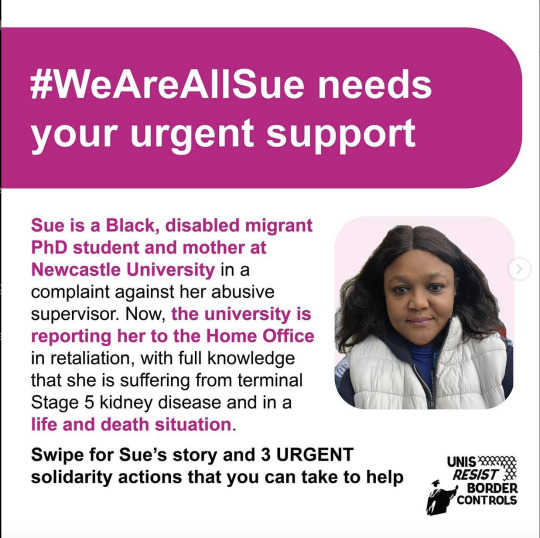
hey guys, I could use your help with something! Sue is a Black disabled mother, migrant, and PhD student at Newcastle University who urgently needs solidarity. Newcastle University is reporting her to the Home Office in retaliation for her complaint about her abusive supervisor, in full awareness of her Stage 5 kidney disease. this is a life-and-death situation.
here's how you can help:
retweet Unis Resist Border Control's tweet about Sue's abusive situation at the University of Newcastle
sign the open letter to Newcastle University by 22 May
pass a motion with your UCU branch (template here)
donate to help Sue find a kidney donor, apply to Leave to Remain, pay solicitor fees, and cover living costs
Sue's story from the #WeAreAllSue toolkit:
In 2022, Sue Agazie, high-achieving in her field, was promised financial support for her tuition fees through scholarships and paid opportunities and enrolled into the PhD programme at Newcastle University Business School with this understanding. When Sue arrived in the UK in 2023, however, she learned that all of this financial promise was a lie; the scholarships that she had been promised never materialised. Instead, she has gone into horrific debt and is having trouble surviving.
For almost a year, Sue sought financial support for herself and her family, including grants and opportunities that would burnish the reputation of her supervisor and university as a whole. However, in that year, her supervisor not only prevented her from applying to scholarships and paid opportunities, but further controlled her research and day-to-day quality of life, with a high-level of surveillance, inappropriate supervisory practices, and escalating harassment of both her and her family.
These practices include this supervisor repeatedly preventing Sue from taking part in important professional development activities, such as research presentations, within the Business School. He also isolated her from her senior colleagues, forbidding her from attending particular activities they were facilitating, or spreading malicious rumours about them. Further, the primary supervisor repeatedly ignored Sue's pleas for support on funding applications and other opportunities that would alleviate the precarious financial situation into which she had been placed, telling her to “stop sending me links to scholarships”.
This behaviour would culminate in the primary supervisor verbally abusing Sue a number of times, and maligning Sue’s husband, alleging that he has been too lazy to financially support her. These inappropriate supervisory practices belie Newcastle University’s commitment to gender equality under the Athena SWAN Charter, for which it holds a Silver award, and for which the Business School holds a Bronze award.
An environment of terror and retaliation
This environment of surveillance, harassment, and terror has grossly impacted the health of Sue as well as that of her spouse and children. In particular, her kidney condition escalated to stage 5 kidney disease, a severe and terminal illness that causes disablement and time-sensitive, highly-delicate medical needs, during this ordeal. The National Kidney Foundation in the United States indicates that “stress and uncontrolled reactions to stress” can “lead to kidney damage.” These compounding issues have also understandably affected Sue's studies, although she has bravely persisted in her research, meeting important deadlines.
Sue raised these issues using relevant avenues of informal complaint, including her supervisory teams and student support services; there are multiple complaints that have been raised in this department. However, she did not receive sufficient support. Further, her severe health issues were not treated with the urgency and importance that they deserved. In October and November 2023, Sue's supervisor accused her of allegedly plagiarising his work in what Sue sees as a malicious act of retaliation and victimisation over her informal complaint, and an attempt to sabotage her reputation not just at Newcastle University, but to prestigious global networks. Following all of this mistreatment, Sue filed a formal complaint against her supervisor in February 2024.
Newcastle University is closing ranks
The university came back to Sue on 5 March 2024 with its response, alleging that she had fabricated the complaint against her supervisor in retaliation for his accusations of research misconduct against her, painting this vulnerable, disabled African student as a malicious liar. The supervisor even denies the relevance of her terminal illness and implicates her young child's behaviour in his response, while maintaining that her terminal illness "has nothing to do with her studies or work pressure here". Sue maintains: “During the time that I was supervised by the primary PhD supervisor, he neither kept in regular communication about my disability nor did he signpost me to relevant services within and outside of Newcastle University that could help me. It is dangerous for the primary supervisor to maintain that my disability would not have affected my studies. His comments show a gross level of disability discrimination that does not befit the reputation that Newcastle University seeks to cultivate as an inclusive place.”
Now, the university is claiming that Sue is not "engaging" sufficiently with the programme, and is threatening to report her to the Home Office, despite a written promise in January 2024 that her status would be unaffected due to the ongoing complaint process, and full knowledge of her terminal stage 5 kidney failure. Adding more insult to injury, Newcastle University Accommodation Service has been hounding Sue for rent arrears, even though they know she is critically ill and in a complaint with the university, surviving with the support of Food & Solidarity. Sue has pleaded with the university’s Accommodation Service for a rent freeze, indicating her urgent health complications and her complaint underway with the university. In all correspondences, the Accommodation Service has ignored Sue’s pleas for clemency. There is real fear that the Accommodation Service will evict Sue, her husband and their child. This will, no doubt, cause real precarity to Sue’s already fragile health condition.
We are appalled that the Newcastle University Business School is utilising obvious misogynoirist tropes to close ranks around a disabled Black migrant student who has been treated horribly, and weaponising her precarious migrant status against her as she attempts to seek justice. We are also aware that Sue is not the only student in this situation and that there have been other complaints in this department. It is a stark illustration of the pernicious institutional racism at Russell Group universities that a disabled Black migrant woman with caring responsibilities has been treated this way not only by a supervisor, but by the institution, as well as the abject way these universities instrumentalise migrant students from the Global South as sources of income that they can afterwards dispose of.
Sue maintains that this ordeal has not diminished her resolve to complete her PhD studies at Newcastle University Business School. She says, “I want to finish my PhD research. But for that to happen, Newcastle University must provide the necessary support for a disabled student in a non-abusive environment. I hope that the university listens to me and we can come to a resolution on this matter soon.”
215 notes
·
View notes
Text
Chiron: where is our physical (and mental) wound?
I'm currently reading a book about Chiron (did you know it's actually half asteroid, half comet? me neither), which inspired me to make this post. I'm in no way an expert in medical astrology, just a curious owl that wants to learn more about every branch of astrology out there (my Sag Venus loves it!!🤭)
DISCLAIMER!!! I'm not a doctor. If you've been feeling any symptoms described here, TALK WITH YOUR DOCTOR, NOT WITH ME

Observation: Before we dive in, i'd like to mention that the position of Chiron in the houses is important. Not every house placement suggests having a poor physical condition. The most prominent Chiron placements when it comes to having a medical condition are: Chiron in 1st house (house of self, visible illnesses), Chiron in 5th house (illnesses since birth/early childhood), Chiron in 6th house (house of health, if Saturn is also sitting there it points to chronic illnesses), Chiron in 8th house (house of death, may point to severe diseases or poor reproductive health) and Chiron in 12th house (house of the unconscious, deals with mental illnesses)
Honorable mention to Chiron in 3rd house and Chiron in 9th house as they represent accidents while travelling. If Chiron is heavily afflicted in these houses (unless it's also conjuncting Jupiter), it may point to...let's just say you're gonna be in a hospital bed in a vegetative state, but remember, nothing has a 100% possibility of happening, you're just more susceptible to it happening. I suggest checking the position of Chiron in Solar Return charts for the possible timing of it happening (look for Chiron in 3rd house/Chiron in 9th house as it activates your natal Chiron)
Without further do, let's dive in⚕️
Chiron in Aries: frequent headaches, frequent nose bleeds, teeth problems (sensitive teeth, tooth decay), deafness, skull fractures, cerebral anemia, brain tumours, hemophilia, epilepsy, BPD
Chiron in Taurus: frequent colds, frequent voice loss, thyroid problems (goiter, hyperthyroidism, hypothyroidis, etc.), tonsilitis, OCD
Chiron in Gemini: lung problems (asthma, tuberculosis, pneumonia, etc.), speech problems (stuttering, cluttering, mutism), alzheimer's disease, ADHD, OCD
Chiron in Cancer: frequent stomach pain, prone to lactose intolerance, (for girls) breast lumps, breast cysts, breast infections, nipple discharge, depression, anxiety
Chiron in Leo: prone to insolation, frequent heart palpitations, chest pain, hypertension, hypotension, arteriosclerosis, scoliosis, kyphosis
Chiron in Virgo: frequent bloating, prone to gluten intolerance, chronic allergies, diabetes, rabies, autism, ADHD, OCD
Chiron in Libra: prone to acne, frequent lower back pain, disc herniation, spondylolisthesis, chronic kidney disease, kidney stones
Chiron in Scorpio: frequent pain down there, chlamydia, gonorrhea, syphilis, HIV/AIDS, depression
Chiron in Sagittarius: frequent pain in the hips, prone to hips dislocation, cirrhosis, sciatica
Chiron in Capricorn: prone to knees dislocation, osteoarthritis, bone problems (osteopenia, osteoporosis), gout, depression
Chiron in Aquarius: electrical injuries, shin splints, osteofibrous dysplasia, ankle sprain, ankle fractures, poor blood circulation, schizophrenia
Chiron in Pisces: prone to break toes, athlete's foot, bunions, addison's disease, hormonal deregulation, aphantasia, psychosis, schizophrenia, anxiety
Yes, i'm aware of the fact that it's a generational planet and it moves very slowly through signs

BONUS: It's important to take into consideration all planets that conjunct, square or opposite Chiron (regardless if they're personal or generational) + the Ascendant for additional info about our illnesses
Ex. Let's take me as an example. My Chiron is in my 10th house in Capricorn squaring Saturn in 4th house (so double Capricorn energy) and Aries Ascendant. Guess what? I've got TMJ (basically a jaw disorder affecting the joints) and i've got it from my fam -_- (Saturn rules tradition i love my fam)
I also believe that having a heavy afflicted Chiron in general makes someone prone to having a medical condition, even if it's not in the houses mentioned previously (like in my case). However, these people are more focused on the main meaning of the house, not their health problems. They tend to ignore their health problems or they just don't care
I hope you enjoyed my post and found it insightful :)
What's your wound? Lmk in the comments your placements and your illnesses
Kisses xoxo
#astro#astro community#astro placements#astrology#astro posts#astro observations#medical astrology#chiron#chiron in aries#chiron in taurus#chiron in gemini#chiron in cancer#chiron in leo#chiron in virgo#chiron in libra#chiron in scorpio#chiron in sagittarius#chiron in capricorn#chiron in aquarius#chiron in pisces#astroblr#astro notes#astrology notes#astro blog
359 notes
·
View notes
Text
maybe it's just me, but when house is listing off his credentials and he's like "i have a double specialty in infections disease and nephrology" it always kinda surprises me because like infectious disease part makes sense. and yes, i am well aware that without the kidneys, you simply wouldn't survive, however i always wonder why he never went for one of the more complex organs like the heart or the brain. like the kidneys just seem so tame in comparison to the job that he does.
56 notes
·
View notes
Text
Today's contribution for Disability Pride Month
Obligatory "I don't have this disorder. I'm raising awareness because I'm so fucking sick of women that drink while pregnant bitching about how hard it is being an 'autism mom'". (Autism mom in quotes because a) it's probably not autism and b) the phrase "autism mom" to describe "mom if an autistic kid" is stupid.)
(I'm going to use the term "women" instead of "uterus haver" not to be exclusionary or transphobic. But because I have a severe headache effecting my ability to find words. I am trans-masc. Don't cancel me. I'm not a FART.)
(This is not to demonize people that suffer from alcoholism. Addiction is a very real disability. This is to raise awareness for one of the only known preventable birth defects and hopefully seek help.)
Thank you for the people at @bfpnola discord for checking my post to make sure this doesn't sound eugenics-y.
Fetal Alcohol Spectrum Disorder (FASD)
FASD (previously known as fetal alcohol syndrome) is a disability that can range from mild to severe dependant on how much the mother drank while pregnant. It only takes one glass of wine while pregnant to cause this disorder
I already know what the fuck this is. Why are you talking about it?
Because your only know about the severe cases diagnosed as fetal alcohol syndrome. You THINK you know what it is. But the reclassification has only come up in like... 2003? Fetal alcohol syndrome is like... the far end worst severity of FASD. And since the new information of it being a spectrum disorder, estimates have the disorder as high as 5% of the population (and I really think it's higher based on some information I'm about to share).
Fine. So what is this... spectrum disorder?
Very good! So this disorder is HIGHLY misdiagnosed as autism. So all those boomers bitching about "the rates of autism going up?" Yeah they probably caused it. Symptoms include low body weight, facial differences, poor coordination, difficulty maintaining attention, poor memory, poor emotional regulation, slower development, poor reasoning skills, issues with the heart, bones, and kidneys, shorter height, shorter head size,
I have all of those things. How do I know it's FASD and not the autism?
That's kinda the issue. The only real way you can know is ask your mom if there's ANY possibility she's had a drink while she was pregnant. I can't stress this enough IT ONLY TAKES ONE DRINK. For instance I have a lot of those issues, but my mom was so paranoid she wouldn't even dye her hair or drink coffee. Like there's NO WAY.
Like what do I do about it?
Mostly get your accommodations met and raise awareness. Like people are still actively drinking while pregnant because they are still under the pre-2000 belief that just a couple of drinks are okay. It's really not. Not to mention most women don't know they're pregnant until 4-6 weeks in. So they shouldn't be drinking if they're actively trying to have a child. Because that increases the risk.
What the fuck. People are drinking while pregnant? I don't believe you.
Each of these claims are linked.
30.3% of all women reported drinking alcohol at some time during pregnancy, of which 8.3% reported binge drinking (4+ drinks on one occasion)
According to the Center for Disease Control, one in 10 (10.2%) of pregnant women in the United States reports drinking alcohol in the past 30 days.
Despite clear evidence that primary prevention of FASD is possible if prenatal alcohol exposure is avoided, up to 80 % of women drink during pregnancy, many before pregnancy recognition
What? Women are drinking while pregnant? That's fucked up.
This is not to say people with FASD are lesser than.
But all of this "curing autism" when most of this "autism" is caused by a pregnant person's ability to stop fucking drinking for literally 5 minutes. THESE WOMEN THAT ARE DRINKING WHILE PREGNANT ARE THE ONES CAUSING ALL OF THIS GIVING "AUTISM". IF YOU DRANK WHILE PREGNANT. IF THERE'S EVEN A SLIVER OF A CHANCE THAT YOUR DRANK WHILE PREGNANT? ITS PROBABLY NOT AUTISM. ITS PROBABLY THIS DISORDER.
I'm just really fed up with all of these "autism moms" that also make "wine mom" jokes and making light of literal alcoholism bitching about how hard it is to be an "autism mom" because YOU'RE THE PROBLEM. STOP LAUGHING ABOUT YOUR ALCOHOLISM AND PUT THE DAMN GLASS DOWN.
But my parents are literally autistic
So they don't really know the generational effect of FASD because the new knowledge is so new. But since FASD is literally genetic issues caused by alcohol while you're in the womb. It's assumed that it can cause issues that are passed down.
But like this diagnosis is SO NEW that we really don't know much.
-fae
#FASD#FAS#fetal alcohol spectrum disorder#fetal alcohol syndrome#disability#disability pride#disability pride month#disability awareness#disability awareness month
146 notes
·
View notes
Text
Health indicators in tarot - Major Arcana meaning
Please like and reblog if you find this information useful! 🌸🎀💕
//don’t claim it as your own and/or repost it on other platforms//

ꕥFool~ Unexpected health events such as accidents and pregnancies. Diseases that are out of our control.
ꕥMagician ~ An over-active mind, watch for illnesses with thinking, communication, learning difficulties, memory problems.
ꕥHigh Priestess ~ Health issues involving hormonal imbalances. This card rules women, the uterus, ovaries, and breasts.
ꕥThe Empress ~ If poorly aspected it denotes laziness, sexual transmitted diseases, and stress from making poor lifestyle choices.
ꕥThe Emperor ~ Sports injuries, war injuries, injuries inflicted in anger, sharp objects harming us, isolation, injuries involving animals. Problems with head and face, blood and muscles.
ꕥThe Hierophant ~ Nutritional deficiencies, lack of emotional support, inadequate medical advice. On a positive note, a strong immune system that resists illnesses.
ꕥThe Lovers ~ Health issues of the skin, eyesight and hearing. Issues with any part of the body that comes in pair, such as eyes, ears, arms, legs, lungs, kidneys.
ꕥThe Chariot ~ Health issues related to genetics, mouth, womb and breasts. Ailments specific to women and pertaining to motherhood.
ꕥStrength ~ Issues with overwork, exhaustion, unhealthy lifestyle and habits and intimacy issues. Problems with heart, circulation, spine, vitality and ribs.
ꕥThe Hermit ~ Problems with the intestines, lower stomach, gallbladder, and spleen.
ꕥWheel of Fortune ~ This card governs the liver and its functions. Toxic build-up in the liver that can cause skin eruptions, low vitality, poor eyesight and allergies.
ꕥJustice ~ Ruled by Libra it governs organs in our core: lower back, kidneys, adrenals, ovaries and inner ear.
ꕥThe Hanged Man ~ This card rules drugs of all kinds and suggests issues with drug addicts, drug poisoning, over-medication or lack of medication. It also suggests sleep disorders, asphyxiation, hypnosis, memory problems, insanity, nervous breakdowns, delusions.
ꕥDeath ~ It rules groin and elimination organs, it suggests problems with the genitals, anus, colon, gonads, prostate, bladder, urethra, pubic bone, and hernias.
ꕥTemperance ~ This card rules anything hot, fast and intense, it suggests a sudden onset of fevers, burns and intemperate behaviour gone too far. Temperance rules exotic places indicating infections from a foreign land or person.
ꕥThe Devil ~ Issues with teeth, bones, joints and knees. Devil also suggests old age, colds, rheumatism, arthritis, aging skin, broken bones and chronic conditions.
ꕥThe Tower ~ This card suggests a sudden onset of symptoms, complications, infections, accidents and confrontations. Be aware of your blood pressure.
ꕥThe Star ~ Issues with ankles, legs, blood circulation, spasmodic complaints, nervous system.
ꕥThe Moon ~ Issues with mental health, alcohol, drugs, malnutrition, disorder of the lymph system, sleep issues, hidden diseases.
ꕥThe Sun ~ Sun burn, sun stroke, eyesight problems, skin cancers, vitamin D deficiency, heart disease, depression.
ꕥJudgement ~ Issues with man-made polluting, toxins, nuclear power, and waste.
ꕥThe World ~ Melancholy about aging and issues with aging. Stress from government agencies. Burdens and stress from carrying the worlds problems on your shoulder.
#tarot#tarotcommunity#tarot witch#tarot reading#tarotblr#tarot community#daily tarot#tarot cards#tarot deck#moni tarot#tarotista#tarotonline#tarotscope#divination#tarot health meaning#health in tarot#moni talks#moni's notes#moni's note#please reblog
19 notes
·
View notes
Text
National Eating Disorder Awareness Week - Diabulimia
CW // Disordered eating
(click for better quality)
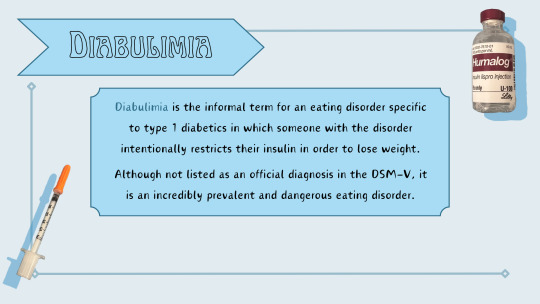
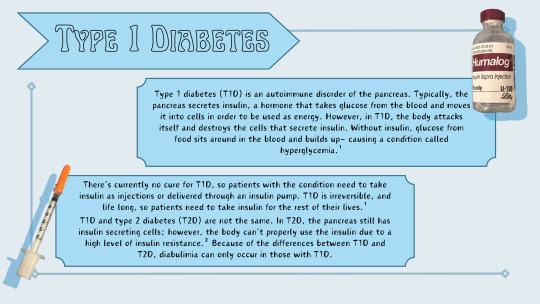
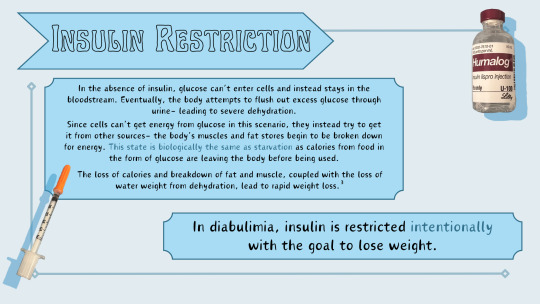

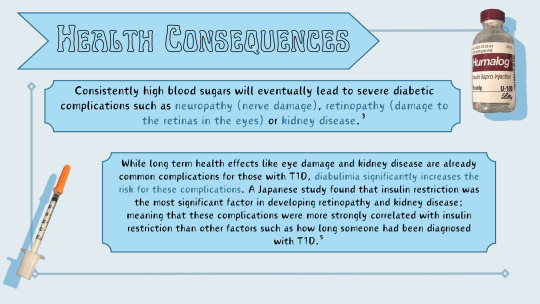


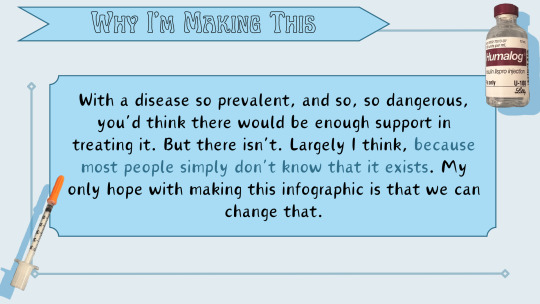
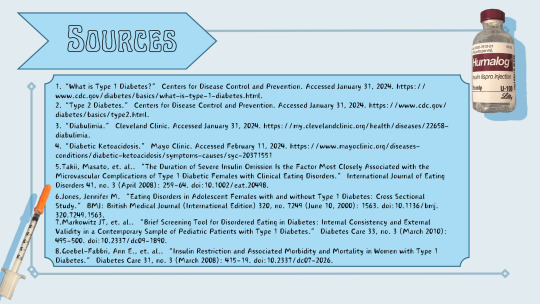
Transcript Below
Diabulimia- Diabulimia is the informal term for an eating disorder specific to type 1 diabetics in which someone with the disorder intentionally restricts their insulin in order to lose weight. Although not listed as an official diagnosis in the DSM-V, it is an incredibly prevalent and dangerous eating disorder.
Type 1 Diabetes- Type 1 diabetes (T1D) is an autoimmune disorder of the pancreas. Typically, the pancreas secretes insulin, a hormone that takes glucose from the blood and moves it into cells in order to be used as energy. However, in T1D, the body attacks itself and destroys the cells that secrete insulin. Without insulin, glucose from food sits around in the blood and builds up– causing a condition called hyperglycemia.¹ There’s currently no cure for T1D, so patients with the condition need to take insulin as injections or delivered through an insulin pump. T1D is irreversible, and life long, so patients need to take insulin for the rest of their lives.¹ T1D and type 2 diabetes (T2D) are not the same. In T2D, the pancreas still has insulin secreting cells; however, the body can’t properly use the insulin due to a high level of insulin resistance.² Because of the differences between T1D and T2D, diabulimia can only occur in those with T1D.
Insulin Restriction- In the absence of insulin, glucose can’t enter cells and instead stays in the bloodstream. Eventually, the body attempts to flush out excess glucose through urine– leading to severe dehydration. Since cells can’t get energy from glucose in this scenario, they instead try to get it from other sources– the body’s muscles and fat stores begin to be broken down for energy. This state is biologically the same as starvation as calories from food in the form of glucose are leaving the body before being used. The loss of calories and breakdown of fat and muscle, coupled with the loss of water weight from dehydration, lead to rapid weight loss.³ In diabulimia, insulin is restricted intentionally with the goal to lose weight.
DKA- In the short term, diabulimia leads to frequent urination and severe dehydration, immense fatigue and nausea and vomiting.³ If left untreated, these high blood sugars will eventually lead to a condition called Diabetic Ketoacidosis (DKA). DKA occurs when fat is broken down in the body. The breakdown of fat releases acidic compounds called ketones. Eventually, with enough build up of ketones, the blood itself becomes acidic and may eventually lead to coma or death.⁴ DKA must be treated in a hospital setting; and as such, is often the way that diabulimics are first treated for their eating disorders.
Health Consequences- Consistently high blood sugars will eventually lead to severe diabetic complications such as neuropathy (nerve damage), retinopathy (damage to the retinas in the eyes) or kidney disease.³ While long term health effects like eye damage and kidney disease are already common complications for those with T1D, diabulimia significantly increases the risk for these complications. A Japanese study found that insulin restriction was the most significant factor in developing retinopathy and kidney disease; meaning that these complications were more strongly correlated with insulin restriction than other factors such as how long someone had been diagnosed with T1D.⁵
Prevalence and Risk- When compared to girls without T1D, those in the same age range that were diagnosed with T1D were around 2.4 times more likely to have an eating disorder ⁶ One study that surveyed 112 teens with T1D found that around 27% restricted insulin dosages ⁷ An 11-year study found that those with T1D who restricted insulin had a risk of death 3.2 times higher than diabetics who did not ⁸
Why I'm Making This- Accessing treatment for diabulimia is incredibly difficult. When I first began to look for inpatient eating disorder treatment, I was turned down from every residential and inpatient facility in my state. The only reason I got into a residential that time was because my mom is a very determined and very convincing woman (she threatened to sue them). And that isn’t even accounting for the lack of diabulimia specific treatment. My last time in treatment, the hospital I was at recommended I enter inpatient; however, there ended up being only a few inpatient centers with diabulimia experience in my country-- the closest one rejected me because they couldn’t find an endocrinologist to oversee my diabetes care. This lack of treatment is especially dangerous with how severe the health consequences of diabulimia are. In fact, since beginning work on this infographic, I found out I may have kidney damage. Yes, as a result of diabulimia. I also have permanent eye damage, neuropathy, and I’m finally (3 months after leaving the hospital) recovering from the short term health consequences of my disorder. And even I am luckier than a lot of other diabulimics. With a disease so prevalent, and so, so dangerous, you’d think there would be enough support in treating it. But there isn’t. Largely I think, because most people simply don’t know that it exists. My only hope with making this infographic is that we can change that.
Sources:
1- “What is Type 1 Diabetes?” Centers for Disease Control and Prevention. Accessed January 31, 2024. https://www.cdc.gov/diabetes/basics/what-is-type-1-diabetes.html.
2- “Type 2 Diabetes.” Centers for Disease Control and Prevention. Accessed January 31, 2024. https://www.cdc.gov/diabetes/basics/type2.html.
3- “Diabulimia.” Cleveland Clinic. Accessed January 31, 2024. https://my.clevelandclinic.org/health/diseases/22658-diabulimia.
4- “Diabetic Ketoacidosis.” Mayo Clinic. Accessed February 11, 2024. https://www.mayoclinic.org/diseases-conditions/diabetic-ketoacidosis/symptoms-causes/syc-20371551
5- Takii, Masato, et. al.. “The Duration of Severe Insulin Omission Is the Factor Most Closely Associated with the Microvascular Complications of Type 1 Diabetic Females with Clinical Eating Disorders.” International Journal of Eating Disorders 41, no. 3 (April 2008): 259–64. doi:10.1002/eat.20498.
6- Jones, Jennifer M. “Eating Disorders in Adolescent Females with and without Type 1 Diabetes: Cross Sectional Study.” BMJ: British Medical Journal (International Edition) 320, no. 7249 (June 10, 2000): 1563. doi:10.1136/bmj.320.7249.1563.
7- Markowitz JT, et. al.. “Brief Screening Tool for Disordered Eating in Diabetes: Internal Consistency and External Validity in a Contemporary Sample of Pediatric Patients with Type 1 Diabetes.” Diabetes Care 33, no. 3 (March 2010): 495–500. doi:10.2337/dc09-1890.
8- Goebel-Fabbri, Ann E., et. al.. “Insulin Restriction and Associated Morbidity and Mortality in Women with Type 1 Diabetes.” Diabetes Care 31, no. 3 (March 2008): 415–19. doi:10.2337/dc07-2026.
#type 1 diabetes#type 1 diabetic#diabulimia#national eating disorder awareness week#neda#eating disorder recovery#diabulimia recovery#mental health#mental health awareness#national eating disorder awareness#diabetes#i tried to make it like an infographic but i write too much and so it's more like a powerpoint... oops...#anyways idk i just wanted more info about this to be out here so i made this#please reblog it would mean a lot <3#zelle.txt
14 notes
·
View notes